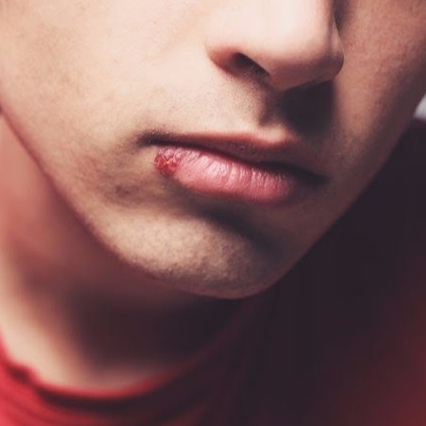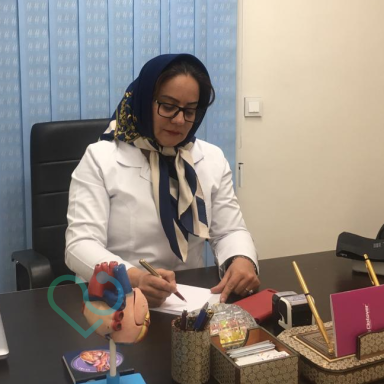Oral herpes (Herpes Simplex Labialis) is a common and contagious condition caused by the herpes simplex virus (HSV). This virus enters the skin or mucous membrane, replicates, and leads to oral sores (on the lips, inside the mouth, tongue, or gums) and symptoms like fever. After this initial phase, the virus moves to the spinal nerve tissue, where it remains dormant but can reactivate due to physical or emotional stress, causing new sores and symptoms. Herpes simplex only affects humans, and two out of three adults are infected. The virus spreads through contact with saliva, mucous membranes, or infected skin. However, oral herpes is generally not serious, and its symptoms usually resolve within a few weeks, with or without treatment using anti-herpes creams.
What Causes Oral Herpes?
Oral herpes is caused by the herpes simplex virus type 1 (HSV-1). This virus typically enters the body before age 20 and affects the lips and surrounding areas of the mouth. It spreads through close contact with an infected person, such as kissing, or by touching objects contaminated with the virus, such as towels, utensils, or razors. The virus remains dormant in nerve cells for life, and stressful conditions can trigger its reactivation. Factors that may lead to recurrent oral herpes include:
- Fever
- Menstruation
- Stress
- Fatigue
- Hormonal changes
- Respiratory infections
- Hot weather
- Weakened immune system
- Dental procedures
Types of Herpes
The herpes virus appears in two forms:
Type 1 Herpes Virus:
Usually transmitted through contact with infected saliva (e.g., kissing, shared utensils, or personal items) and is associated with infections around the mouth, lips, and face.
Type 2 Herpes Virus:
Transmitted through high-risk sexual activity and contact with genital sores. It can also spread through oral and sexual contact. For assurance, an HPV test is recommended to prevent further spread of the disease.
What Are the Symptoms of Oral Herpes?
Initial infection may cause mild or no symptoms, but within 1 to 3 weeks after the first exposure, blisters often appear near or on the mouth. These blisters typically heal within three weeks, but recurrent infections may have more severe symptoms:
- Blisters or sores on the mouth, lips, tongue, nose, or gums
- Burning or pain around the blisters
- Tingling or itching near the lips
- Clusters of small blisters that grow together and may become red and inflamed
- A tingling or warm sensation near the lips, often a warning sign that sores will appear within 1-2 days
Possible Complications of Oral Herpes
- Frequent recurrence of sores requiring continuous treatment
- Spread of the virus to other areas of the skin
- Infections in individuals with weak immune systems, which can be dangerous
- Corneal ulcers (if sores develop near the eyes)
If a child under 8 weeks contracts this virus, they must see a doctor, as complications like severe infections and brain damage may occur. For a complete checkup and a blood test, click here.
Home Remedies for Treating Oral Herpes
- Treating Herpes with Lemon
Applying a slice of lemon to the cold sore can reduce redness and swelling due to its antiviral properties. Lemon balm capsules are also available on the market.
- Treating Herpes with Hot and Cold Compresses
Hot or cold compresses can relieve pain and itching from cold sores. A hot compress can prevent blister formation during infection, while a cold compress reduces inflammation. Avoid placing ice directly on the sore.
- Treating Herpes with Aloe Vera
The anti-inflammatory and antiviral effects of aloe vera gel can help soothe and treat cold sores.
- Treating Herpes with Sunscreen
Applying sunscreen can aid in healing cold sores, and regular use on the lips may prevent recurrences.
- Treating Herpes by Reducing Stress
Stress activates the herpes virus. Activities like meditation, regular exercise, and avoiding stressors can help reduce stress levels.
- Treating Herpes with Pain Relievers
Medications like ibuprofen or acetaminophen can alleviate the pain associated with cold sores.
- Treating Herpes with Apple Cider Vinegar
Apple cider vinegar's antimicrobial properties can help treat cold sores. However, it should be diluted and applied only once or twice daily, as it can irritate the skin.
- Treating Herpes with Tea Tree Oil
If the scent is tolerable, diluted tea tree oil can be effective against cold sores.
- Treating Herpes with Garlic
Some older studies suggest that allicin in garlic may combat the herpes virus, but there is no definitive evidence to confirm this.
- Treating Herpes with Kanuka Honey
Recent studies indicate that Kanuka honey from New Zealand's Manuka tree may be as effective as acyclovir in treating cold sores.
- Treating Herpes with Lysine
This essential amino acid, available as an oral supplement or cream, prevents recurrent cold sores. Consult your doctor before using lysine, as no optimal dosage or preparation type has been established.
- Treating Herpes with Peppermint Oil
Peppermint oil is effective against the herpes simplex virus. Applying diluted peppermint oil at the first sign of tingling can be beneficial.
- Treating Herpes with Vitamins
Vitamin D strengthens the immune system, reducing cold sore recurrence, while Vitamin E's antioxidant properties build stress resistance. If vitamin E capsules are unsuitable, consume foods like spinach, avocados, and olive oil, rich in vitamin E.
- Treating Herpes with Pomegranate
Known as a natural anti-infective remedy, pomegranate contains zinc and is effective in reducing herpes-related infections.
Medical Treatment for Herpes
Herpes sores typically resolve on their own within a few days, but antiviral medications such as acyclovir (Zovirax), valacyclovir (Valtrex), penciclovir (Denavir), and famciclovir can speed recovery. Oral or injectable medications are usually prescribed for individuals with weak immune systems, such as infants under 6 weeks or patients with severe illnesses.
How to Prevent Herpes Spread?
- Boil contaminated towels or items.
- Avoid sharing utensils or personal items with infected individuals.
- Refrain from kissing or oral sexual contact with someone who has herpes.
- Avoid touching blisters or sores, and wash hands with soap and water immediately if contact occurs.
Sources:
healthline.com,
medicalnewstoday.com,
webmd.com












Our Customers' Comments
No comments registered